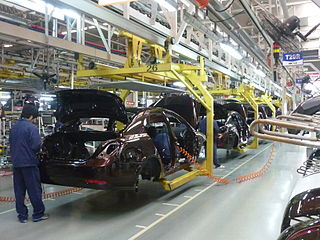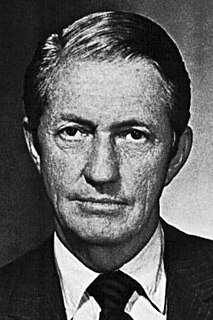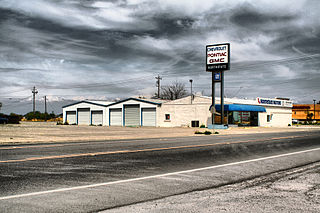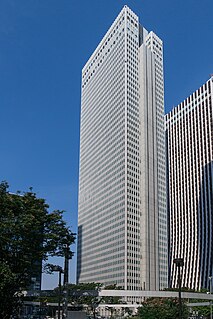Related Research Articles

James Joseph Heckman is a Nobel Prize winning American economist who is currently at the University of Chicago, where he is The Henry Schultz Distinguished Service Professor in Economics and the College; Professor at the Harris School of Public Policy; Director of the Center for the Economics of Human Development (CEHD); and Co-Director of Human Capital and Economic Opportunity (HCEO) Global Working Group. He is also Professor of Law at the Law School, a senior research fellow at the American Bar Foundation, and a research associate at the National Bureau of Economic Research. In 2000, Heckman shared the Nobel Memorial Prize in Economic Sciences with Daniel McFadden, for his pioneering work in econometrics and microeconomics. As of December 2020, according to RePEc, he is the second most influential economist in the world.

The automotive industry comprises a wide range of companies and organizations involved in the design, development, manufacturing, marketing, and selling of motor vehicles. It is one of the world's largest industries by revenue. It is also the industry with the highest spending on research & development.

The E-M-F Company was an early American automobile manufacturer that produced automobiles from 1909 to 1912. The name E-M-F was gleaned from the initials of the three company founders: Barney Everitt, William Metzger, and Walter Flanders.

Magna International Inc. is a Canadian mobility technology company for automakers. It is one of the largest companies in Canada and was recognized on the 2020 Forbes Global 2000. The company is the largest automobile parts manufacturer in North America by sales of original equipment parts, it has ranked consistently in the Fortune Global 500 list for 20 years in a row since 2001. It produces automotive systems, assemblies, modules, and components, which are supplied to General Motors, Ford Motor Company and FCA, as well as BMW, Mercedes, Volkswagen, Toyota, Tesla, and Tata Motors, among others.
Federal-Mogul Corporation is an American developer, manufacturer and supplier of products for automotive, commercial, aerospace, marine, rail and off-road vehicles; and industrial, agricultural and power-generation applications. It was acquired in October 2018 by Tenneco.

AutoNation is an American automotive retailer based in Fort Lauderdale, Florida, which provides new and pre-owned vehicles and associated services in the United States. The company was founded by Wayne Huizenga in 1996, and has more than 300 retail outlets.

Sir Raymond William Firth was an ethnologist from New Zealand. As a result of Firth's ethnographic work, actual behaviour of societies is separated from the idealized rules of behaviour within the particular society. He was a long serving Professor of Anthropology at London School of Economics, and is considered to have singlehandedly created a form of British economic anthropology.

Roy Dikeman Chapin Jr. was the chairman and chief executive officer of American Motors Corporation (AMC). Chapin's father, Roy D. Chapin Sr., was one of the co-founders of the Hudson Motor Car Company; Hudson later merged with Nash-Kelvinator Corporation in 1954 to form American Motors. Roy D. Chapin Jr. was instrumental in introducing many successful lines of cars by American Motors that included the Gremlin, Hornet, and Javelin, as well as the purchase of Kaiser Jeep by the automaker.

Rochester Products Division (RPD) was a division of General Motors that manufactured carburetors, and related components including emissions control devices and cruise control systems in Rochester, New York. In 1995 Rochester became part of Delphi, which in turn became a separate company four years later, and continues to manufacture fuel injection systems in Rochester, now part of General Motors Automotive Components Holdings- Rochester Operations.
The Little were two automobiles built in Flint, Michigan, from 1912 – 15 and the company, Little Motor Car Company, founded by William H. Little and William C. Durant that built them. It was incorporated into the current Chevrolet Motor Company.

Beginning in the later half of 2008, a global-scale recession adversely affected the economy of the United States. A combination of several years of declining automobile sales and scarce availability of credit led to a more widespread crisis in the United States auto industry in the years of 2008 and 2009.

Ron Bloom is an American economic advisor who served as a senior official in the Obama Administration from February 2009 to August 2011. This included working as the Assistant to the President for Manufacturing Policy between February 2011 and August 2011, in the Department of the Treasury as a senior advisor to the Secretary of the Treasury, as a member of the President's Task Force on the Automotive Industry, and as senior counselor to the president for manufacturing policy. From 1996 to 2008, Bloom served as special assistant to the president of the United Steelworkers. Bloom also worked for the investment banking firm Lazard on two occasions, the second as Vice Chairman, U.S Investment Banking. Bloom is the vice chair and a managing partner of Brookfield Asset Management and served as chairman of the Board of Governors of the United States Postal Service.

The automotive industry in the United States began in the 1890s and, as a result of the size of the domestic market and the use of mass production, rapidly evolved into the largest in the world. The United States was the first country in the world to have a mass market for vehicle production and sales and is a pioneer of the automotive industry and mass market production process. During the course of the 20th century global competitors emerged especially in the second half of the century primarily across European and Asian markets, such as Germany, France, Italy, Japan and South Korea. The U.S. is currently second among the largest manufacturer(s) in the world by volume.
South Gate Assembly was a General Motors automobile plant located at 2720 Tweedy Boulevard in the Los Angeles suburb of South Gate, California. It opened in 1936 to build B-O-P (Buick-Oldsmobile-Pontiac) cars for sale on the west coast. It was the first GM plant to build multiple car lines, resulting from a Depression-spawned move to cut production costs by sharing components and manufacturing. South Gate was the second of several B-O-P "branch" assembly plants, part of GM's strategy to have production facilities in major metropolitan cities. Engine block and cylinder heads were cast at Saginaw Metal Casting Operations, internal engine components were created at Bay City Powertrain and the engines were then assembled at Tonawanda Engine and Romulus Engine.

ShahidRafiqKhan is a Pakistani-American billionaire businessman and sports tycoon. He is the owner of Flex-N-Gate, an American automotive company. Khan is also the owner of the Jacksonville Jaguars of the National Football League (NFL) and Fulham F.C. of the EFL Championship, and co-owner of the American wrestling promotion All Elite Wrestling (AEW), along with his son, Tony Khan.
A metropolitan economy refers to the cohesive, naturally evolving concentration of industries, commerce, markets, firms, housing, human capital, infrastructure and other economic elements that are comprised in a particular metropolitan area. Rather than the definition of distinct urban and suburban economies that evolve and function independently, a metropolitan economy encompasses all interdependent jurisdictions of particular regional clusters. This type of economy has all its units functioning together in a trans-boundary landscape that often crosses city, county, state, province, and even national lines. Metropolitan economies expand from the parochial view taken in urban economics which focuses entirely on a city's spatial structure, and broadens it into a metropolitan's spatial and social/economic structure.

The Keihin Corporation is a Japanese automotive and motorcycle parts company headquartered in Shinjuku, Tokyo, Japan. The company is a major supplier to Honda, who owns nearly half of Keihin's shares, but also supplies other motorcycle manufacturers, among them Triumph, Suzuki, Kawasaki, KTM, Royal Enfield and Harley-Davidson. In addition to carburetors, Keihin supplies the automotive industry with engine, transmission, and climate control products, including intake manifold assemblies, HVAC assemblies, compressors, valves, solenoids, and engine control units.

APL Logistics Ltd. (APLL) is a wholly owned subsidiary of Kintetsu World Express, Inc. (KWE), a Japan-based freight forwarding and transportation company. As a global supply chain specialist, APL Logistics trades in more than 60 countries, serving the automotive, consumer, industrials, and retail verticals. Headquartered in Singapore, APL Logistics has locations across the globe.
Briggs Manufacturing was an American, Detroit-based manufacturer of automobile bodies for Ford Motor Company, Chrysler Corporation and other U.S. and European automobile manufacturers.
Murray Corporation of America run from 1600 Clay Street, Detroit Michigan was, from 1925 until 1939, a major supplier of complete automobile bodies to the Ford Motor Company. Non-automotive stamped steel products were added during the great depression of the 1930s. Production switched to wings for wartime aircraft and other aircraft components. Postwar they moved further into stainless steel products including cabinets and kitchen sinks. Washing machines, plumbing and bathroom fixtures, cutting tools and truck engine parts followed. Their last automotive products plant was sold in 1955.
References
- ↑ Samovar, Larry, Richard Porter, and Edwin McDaniel. Communication between cultures. Cengage Learning, 2009.
- ↑ Holmes, Thomas J. "Localization of industry and vertical disintegration." Review of Economics and Statistics 81.2 (1999): 314-325.
- ↑ Klier, Thomas H., and James M. Rubenstein. Who really made your car?: restructuring and geographic change in the auto industry. WE Upjohn Institute, 2008. p. 397